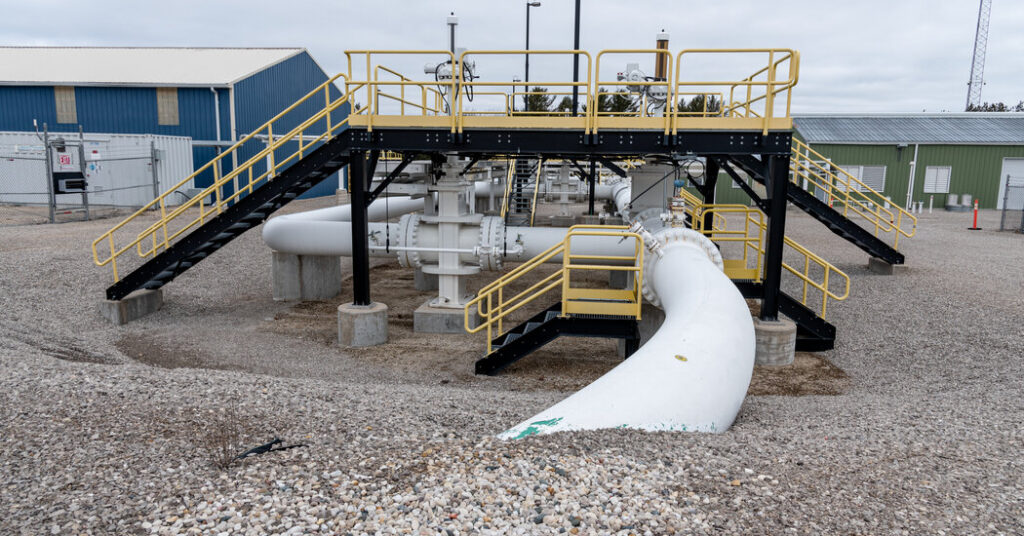The U.S. Army Corps of Engineers has created a new class of “emergency” permits for fossil fuel projects, raising the possibility that pipelines, mines, power plants and other facilities could be fast-tracked for approval as part of President Trump’s demand to increase oil, gas and coal production.
The move could reduce the opportunities for the public and local officials to weigh in on the effects of proposed projects. It may even short-circuit the National Environmental Policy Act, a 55-year-old law that requires federal agencies to analyze the environmental effects of major projects before they are built. That process can take months or even years, depending on the project’s complexity.
“The Trump administration appears to be gearing up to use false claims of an ‘energy emergency’ to fast-track and rubber-stamp federal approvals for projects across the country that will be destructive to America’s wetlands, waterways and communities,” said David Bookbinder, the director of law and policy at the Environmental Integrity Project, a watchdog group.
Any individual, company or federal or state agency that wants to build a project in navigable waters of the United States, or discharge anything into those waters or wetlands, needs a permit from the Army Corps of Engineers.
For decades, the Corps granted emergency permits to quickly repair roads, shipping channels and other facilities that have been destroyed by a hurricane or other calamity. In those cases, lives and property were at stake.
But in recent days, the agency has made hundreds of energy projects eligible for expedited decisions, citing an executive order signed by Mr. Trump that declared that the United States faced an energy emergency. Mr. Trump directed the agency to draw up a list of key projects and ordered it to “use, to the fullest extent possible and consistent with applicable law, the emergency Army Corps permitting provisions to facilitate the nation’s energy supply.”
The United States is producing more oil than any other nation in history, and is also the world’s biggest exporter of natural gas. But Mr. Trump campaigned on a promise to make it even easier and cheaper for companies to produce more fossil fuels, the burning of which is dangerously heating the planet.
Mr. Trump said he would expedite permits for anyone investing more than $1 billion in energy projects or other infrastructure in the United States and slash the red tape that has long stymied big construction projects.
Projects that are now getting priority from the Army Corps include some disputed oil and gas facilities. One has to do with Line 5, an oil and gas pipeline that crosses 645 miles of Wisconsin and Michigan, and calls for boring a tunnel under the Straits of Mackinac between Lake Michigan and Lake Huron. Another is a gas liquefaction and export facility in Louisiana being built by Venture Capital L.L.C., which would be adjacent to a proposed gas export terminal that would be the largest in the United States. A third is a proposed deepwater crude oil export terminal off the coasts of Texas and Louisiana. The list also includes solar energy projects and the construction of transmission lines across waterways.
The Army Corps did not explain how the projects had been selected or how the new “energy emergency” permitting category would allow projects to move ahead more quickly.
“The Department of Defense will fully execute and implement all directives outlined in the executive orders issued by the president, ensuring that they are carried out with the utmost professionalism, efficiency, and in alignment with national security objectives,” Doug Garman, a spokesman for the agency, said in a statement.
Lawyers familiar with the process said that based on previous emergency permit applications, the agency could reduce or even eliminate opportunities for the public to comment on certain projects or reduce the amount of time that engineers at the agency have to analyze environmental threats posed by a project and propose changes.
Mr. Bookbinder noted that Army Corps policies define an “emergency” as a situation that could result in an unacceptable hazard to life, a significant loss of property or an immediate, unforeseen and significant economic hardship.
“This end run around the normal environmental review process is not only harmful for our waters, but is illegal under the Corps’ own emergency permitting regulations,” he said.
Others disagreed. Ann D. Navaro, a partner at Bracewell, a law firm that advises energy clients, said the Corps had the discretion to determine what would be covered under its emergency regulations, as well as to try to make the permitting process more efficient.
“I expect the regulated community will welcome any procedures the Corps will develop that would make the processing of energy permits more efficient,” she said.
The fact that a project is listed for emergency permit consideration does not automatically mean it will be granted, but nationwide the Corps denies fewer than 1 percent of applications, according to the agency.
Line 5 is a 72-year-old pipeline that runs from Wisconsin to Canada and transports up to 540,000 barrels of crude oil and natural gas liquids a day, crossing Lake Michigan and Lake Huron. There have been growing concerns about the risk of leaks from the pipeline, which has been damaged by strikes from ships, particularly in the environmentally sensitive area in the Straits of Mackinac.
Enbridge, the Canadian company that owns the pipeline, wants to replace a section of Line 5 with a concrete tunnel running four miles under the Mackinac Straits. It has said that would make the project safer. The state of Michigan wants to shut down the pipeline, saying that a 1953 easement for the pipeline’s operation violated the state’s public trust doctrine. It is locked in a court battle with Enbridge.
Ryan Duffy, a spokesman for Enbridge, noted in a statement that the company had applied for a permit from the Corps for the concrete tunnel in April 2020. “After nearly five years, the project still awaits action by the U.S. Army Corps of Engineers on an environmental-impact statement and a permitting decision,” he said.
Opponents of Line 5 argue that running a hazardous liquids pipeline through a confined underground tunnel has not been tried elsewhere and risks explosions. They want to the Corps to conduct a thorough environmental review.
“If this is pushed through on an emergency permit, the implications of an oil spill if there’s an explosion or something during tunnel construction is that over 700 miles of Great Lakes shoreline could be at risk,” said Sean McBrearty, the Michigan policy director for Clean Water Action, an environmental group.
In Louisiana, Matt Rota is the senior policy director for Healthy Gulf, an environmental group that is opposed to a proposed deepwater oil and gas terminal known as Blue Marlin in the Gulf of Mexico, which Mr. Trump has renamed the Gulf of America. Mr. Rota said the development could destroy more than 100 acres of wetlands.
“Even though we don’t know exactly what this expedited process is going to look like, one can assume that means we are going to be fast-tracking environmental reviews,” Mr. Rota said, adding, “That is unacceptable for a coast in Louisiana that loses a football field of wetlands every hour.”
Energy Transfer, the company behind the project, did not respond to request for comment.
Some of the projects that the Corps has flagged as needed because of an energy emergency do not appear to address energy at all. They include a proposed housing development called West Coyote Hills in Orange County, Calif., to be built on what was once a Chevron oil field.
Then there’s the Rock & Roll Hall of Fame in Cleveland. Its project before the Corps does involve energy — a proposed geothermal system to heat and cool the museum’s expansion.
The Corps did not explain why that project is considered necessary because of a national emergency. The Rock & Roll Hall of Fame did not respond to a request for comment.



